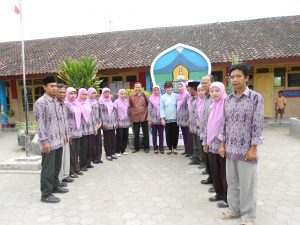Memo #175
By Anna Dall – adall1 [at] usc.edu.au
Indonesian students perform consistently poorly in international surveys. In the 2009 Programme for International Student Assessment (PISA) survey, more than half of 15-year-old students were found to be lacking sufficient skills in reading literacy to enable them to participate actively and effectively in society, to be functionally literate. The background to this dire situation is complex. But the examination system may be an important contributing factor.
Indonesian education is focused on tests, and in particular on the all-important national exams, that millions of Indonesian high school students take. The exam is of crucial importance and the pressure on students is huge. Students have even been known to commit suicide after failing the exam. Cheating is commonplace.
Exam results are used to evaluate teachers. Therefore they teach to the test and an enormous amount of time is devoted to test preparation. Since the national exams are multiple choice, rote teaching and learning are the methods generally used, and simple cognitive skills take precedence over more complex skills involving analysis, evaluation, critical thinking, and problem solving. Many teachers themselves find this highly unsatisfactory, but believe their hands are tied.
Schools are strongly affected by the students’ exam performance. Achievement outcomes affect funding, the school’s reputation, and capacity to attract students. Thus corruption is allegedly rampant. Teachers and principals have often been reported to support student cheating.
The opposition against the national exams is widespread, among educators and parents. There is even a Supreme Court ruling to suspend the implementation until there is equal educational infrastructure across the country, to no avail.
The national examination system is intended to improve student performance. Instead, it seems Indonesian education is held in an iron grip by an assessment system, with low validity and low reliability, which ensures that teaching and learning remain at a low cognitive level.
A number of reforms are currently being implemented to improve education in Indonesia. The addition of an assessment system that rewards teachers and students for genuine learning would add to the positive impact and constructively support the shared goal of authentically improved student performance.
About the Author:
Anna Dall was awarded a PhD for her thesis “A Cross-National, Comparative Study of Cultural Factors Underpinning 15-Year Old Students’ Performance in Reading Literacy in Finland, Sweden and Indonesia”. She currently resides in Indonesia.
Links:
- A Cross-National, Comparative Study of Cultural Factors Underpinning 15-Year Old Students’ Performance in Reading Literacy in Finland, Sweden and Indonesia. University of the Sunshine Coast, 2012. (PhD Thesis by Anna Dall)
- Cheating Front and Center as National Exams Begin, Jakarta Globe, April 16, 2012.
- Questioning National Exams and the Politics of Gatekeeping, The Jakarta Post April 21, 2012.
- Cheating during National Exams in Seven Provinces, tempointeractive, April 20, 2012.
- Indonesian Education: Teachers, Schools, and Central Bureaucracy, June 2005. (Book by Christopher Bjork)
Related Memos:
- Our other Memos on Indonesia and Southeast Asia.

